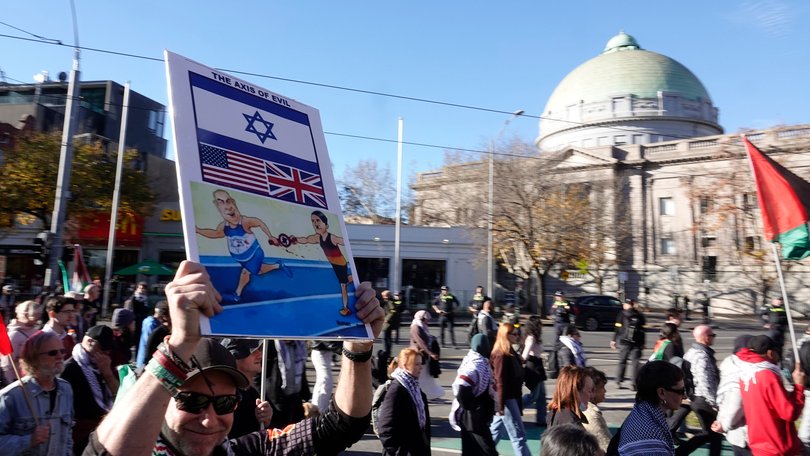DVIR ABRAMOVICH: Anti-Semitism in Australia is now mainstream, and this plan may be our last warning
DVIR ABRAMOVICH: Australia is facing a dangerous rise in anti-Semitism, and the government’s new plan must be a turning point, not just a promise.

There are moments in a nation’s life when something invisible shifts quietly, but irreversibly. What was once shrugged off or hidden in corners moves into the centre of the room and dares us to look away.
This is where Australia finds itself now.
For years, anti-Semitism was spoken of in the past tense. It lived in textbooks and museum plaques. It was something defeated, denounced, behind us.
Sign up to The Nightly's newsletters.
Get the first look at the digital newspaper, curated daily stories and breaking headlines delivered to your inbox.
By continuing you agree to our Terms and Privacy Policy.But history, as we know, does not retire. It waits. And lately, it has returned to our streets with fire, with chants, with the slow corrosion of decency.
A synagogue burned. A childcare centre firebombed. Jewish restaurants stormed by mobs calling for death. Teenagers spit on. Students removing their Star of David necklaces. Artists doxxed. And through it all, the same tired equivocations: “It’s just political.” “It’s about Israel.” “We’re not that kind of country.”
But we are. Or at least, we are becoming it.
And so when the Albanese Government today said, “Enough,” something happened. Not a solution, not an end, but something rarer, a turning.
The plan unveiled by the Prime Minister, Tony Burke, and Special Envoy Jillian Segal is sweeping, ambitious, and overdue. It names the threat. It traces its roots. It lays down standards for universities, for broadcasters, for festivals and for schools.
It says clearly: there is a line between protest and persecution, and we will not let it be blurred.
In a climate where moral clarity is often a casualty of political caution, this matters.
Because anti-Semitism is not simply another form of prejudice. It is older. It is more adaptable. It wears many masks: conspiracy, religious hatred, anti-Zionism.
But it always ends the same way: with isolation, with fear, and sometimes with fire.
This plan acknowledges that reality. And it does something more. It puts responsibility where it belongs, on institutions, on educators, on leaders. On us.
It asks hard things of our universities, whose response to anti-Semitism has been, at best, sluggish.
It calls out the arts sector, where Jewish voices have been silenced or demonised in the name of creative expression. It presses public broadcasters to remember that freedom of speech is not freedom from standards.
And perhaps most importantly, it demands that education begin early and urgently. That we teach our children what hate sounds like, before they’re old enough to echo it.
But policy alone will not save us. We must also confront the culture that allowed anti-Semitism to fester in the first place.
The culture that rationalised hate as dissent, that painted targets on Jewish Australians and then pretended not to notice when someone pulled the trigger.
We must name that culture, and we must dismantle it.
That starts with language. Refusing to look the other way when someone says: “They brought it on themselves.” By ending the indulgence of slogans that carry the weight of historical violence. Push back when people confuse moral cowardice for complexity.
And it continues with action. If a university tolerates chants of death on its quad, it forfeits public trust. If a theatre grants a platform to those who call for violence, it loses the privilege of public funding. If a student feels unsafe in class because of their heritage, then the system has failed plain and simple.
This plan, if implemented with urgency and courage, could be a hinge in our national story. But it will test us.
It will test whether we mean what we say about inclusion. It will test whether we are willing to act before the next fire, not after. It will test whether we understand that the measure of a democracy is not how it treats its most popular, but how it protects its most vulnerable.
In this sense, antisemitism is not just a Jewish problem. It is a barometer of civic health. It tells us how we are doing at holding the fragile threads of pluralism, decency, and truth.
So let this be a beginning.
Let it be the moment when Australia did not flinch. When it looked the ancient hatred in the face and said, “You do not belong here.”
Not in our classrooms. Not on our stages. Not in our cities.
And not in the hearts of our children.
Because when a Jewish family wonders if it’s safe to light Shabbat candles, the soul of the nation flickers.
This plan is a match. Now we must use it to light a better way forward.
Dr Dvir Abramovich is Chair of the Anti-Defamation Commission
